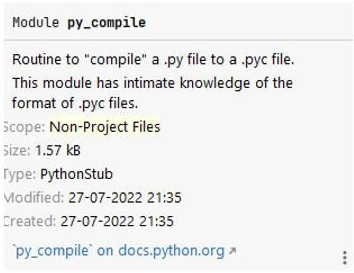
 Data Structure
Data Structure Networking
Networking RDBMS
RDBMS Operating System
Operating System Java
Java MS Excel
MS Excel iOS
iOS HTML
HTML CSS
CSS Android
Android Python
Python C Programming
C Programming C++
C++ C#
C# MongoDB
MongoDB MySQL
MySQL Javascript
Javascript PHP
PHP
- Selected Reading
- UPSC IAS Exams Notes
- Developer's Best Practices
- Questions and Answers
- Effective Resume Writing
- HR Interview Questions
- Computer Glossary
- Who is Who
How do I create a .pyc file in Python?
To create a .pyc file in Python, use the PyCompile. The official documentation even suggests the same as shown below ?

The py_compile module
The py_compile module provides a function to generate a byte-code file from a source file, and another function used when the module source file is invoked as a script. The py_compile.compile() compile a source file to byte-code and write out the byte-code cache file.
Now, let us see the example
import py_compile py_compile.compile("demo.py")
Use the py_compile.main()
import py_compile py_compile.main(['File1.py','File2.py','File3.py'])
The compileall module
The compileall module provides some utility functions to support installing Python libraries. These functions compile Python source files in a directory tree. This module can be used to create the cached byte-code files at library installation time, which makes them available for use even by users who don't have write permission to the library directories.
You can also compile from the command line using the compileall module ?
python -m compileall <file_1>.py <file_n>.py
Compile every single file in the mentioned directory. The compile_dir() recursively descend the directory tree named by dir, compiling all .py files along the way. Return a true value if all the files compiled successfully, and a false value otherwise
import compileall compileall.compile_dir(direname)
Use compileall.compile_file(): The compile_file() method compile the file with path fullname. Return a true value if the file compiled successfully, and a false value otherwise ?
import compileall compileall.compile_file('YourFileName.py')

